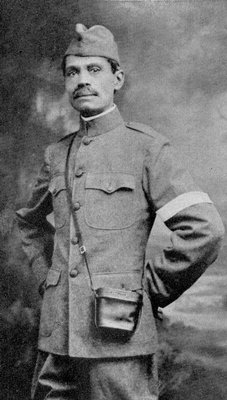Ralph Waldo Tyler facts for kids
Ralph Waldo Tyler (1860–1921) was an important African-American journalist, a reporter during wartime, and a government worker. He was the only Black reporter officially sent to France during World War I. His job was to write about African-American soldiers serving there.
Contents
Early Career as a Journalist
Tyler started his writing career in his hometown of Columbus, Ohio, in the late 1880s. He worked in many different newspaper jobs.
- He was an editor for the Afro-American newspaper.
- He helped start a short-lived Black newspaper called The Free American.
- He wrote a news column about Black communities.
- He was a society editor for the Columbus Evening Dispatch, which was owned by white people.
- He also wrote for The Ohio State Journal.
Tyler's writing skills quickly made him well-known among Black leaders in the Midwest. These leaders were working hard to improve the lives of African Americans during the time of Jim Crow laws. These laws made it legal to separate Black and white people and treated Black people unfairly.
Working in Government
In 1906, Tyler worked to get a job as a United States consul (a government official who helps citizens in another country) in Brazil. His political activities caught the attention of important Black leaders across the country.
In 1907, Booker T. Washington, a famous Black leader, suggested Tyler for a job. President Theodore Roosevelt then appointed Tyler to be the Auditor of the Department of the Navy. This meant he checked the Navy's financial records. He held this job until 1913.
During the first year of Woodrow Wilson's presidency, Tyler wrote an article for the Washington Evening Star. In the article, he criticized President Wilson's policies that separated Black and white people, even in government offices. Soon after, Tyler lost his government job.
Helping Black Businesses and Communities
After leaving the government, Booker T. Washington and his secretary, Emmett J. Scott, recommended Tyler for a new role. He became the National Organizer for the National Negro Business League (NNBL). Washington had started this group to keep track of Black businesses and help them grow.
Tyler traveled all over the country for the NNBL. He visited local branches and gave speeches. He learned a lot about the lives and concerns of Black people everywhere. He wrote about what he found in a newspaper column in 1914.
His travels through the Southern U.S. also allowed him to study the Great Migration. This was when many Black people moved from the rural South to cities in the North and Midwest. Tyler's reports were published in many magazines, journals, and newspapers. In 1917, he left the NNBL. He then worked as secretary for another group started by Washington, called the National Colored Soldiers' Comfort Committee. This group helped Black soldiers and their families with money.
Reporting on Black Soldiers in World War I
After this, Tyler was chosen for a very special job. He became the only African-American journalist sent overseas during World War I to report on Black soldiers fighting in the war.
About 30,000 Black combat soldiers and 160,000 Black Army workers were in France. However, most newspapers did not write much about their brave actions. So, in 1918, a group of Black journalists and leaders, led by Emmett J. Scott, decided to do something. They chose Tyler to report on the Black troops.
At that time, Scott worked for the U.S. government. He was a special assistant to the Secretary of War, Newton Baker, dealing with race relations. The U.S. government was also worried. They feared that Black people, who faced racism at home and in France, might be influenced by German propaganda.
Scott convinced Baker to send Tyler to report on the Black soldiers. There was one condition: Tyler's reports had to be checked by Baker and a group called the Committee on Public Information (CPI). Then, Scott would check them before they were sent to U.S. newspapers.
Tyler later said he took the job without a salary. He would only be paid for his travel and living costs. This way, he felt he could speak freely about what he saw once he returned home. He was stationed in the northeast Metz region of France. He was with the all-Black 92nd division of General John J. Pershing's army.
Tyler sent his reports from the battle trenches. His reports were checked by the U.S. Committee on Public Information. Then they were sent back to the U.S. Scott edited and shared them with newspapers and journals across the country. Later, Scott published some of Tyler's reports in his book, Scott's Official History of the American Negro in The World War (1919).
After the War
Back in the United States, Tyler's reports gave people first-hand stories of the brave actions of Black soldiers. His stories also helped boost the spirits of the troops overseas. He also wrote about the unfair treatment Black troops faced from white American groups and service members. He compared this to the much fairer treatment they received from the French people.
After the war, Tyler returned to Ohio. He continued working in journalism.
- In 1919, he became the editor of the Cleveland Advocate.
- He was also an associate editor of the Columbus Ohio State Monitor.
- He wrote articles for newspapers in New York and Chicago.
Many of Tyler's personal letters can be found at the Ohio Historical Society. The Schomburg Center for Research in Black Culture has Tyler's business letters and reports from his time as National Director of the National Negro Business League.
 | Valerie Thomas |
 | Frederick McKinley Jones |
 | George Edward Alcorn Jr. |
 | Thomas Mensah |


